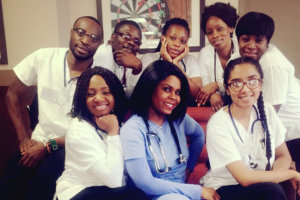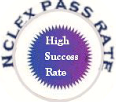
PRACTICAL NURSING PROGRAM DESCRIPTION
Program Hours: 1330 Hours
Program duration: AM 13-14 months/PM 13-14 months
Program delivery mode: Residential
The practical nursing program is comprehensive and intensive. The program is designed to educate and train students to gain knowledge and skills to safely care for patients across the life span. The program introduces students to classroom, lab and clinical experiences. Course work covers human anatomy & physiology, concepts in nursing, disease processes, pharmacology and the duties, responsibilities, laws and regulations of a practical nurse. Students will develop the skills needed for entry level job. Students who graduate from this program will receive a Practical Nursing certificate of completion and are eligible to take the NCLEX- PN Examination offered by the National Council of State Board of Nursing (NCSBN). The program is certified by State Council of Higher education (“SCHEV”). Upon completion, students are qualified to work in health care settings such as long-term care nursing facilities, clinics, hospitals, physician’s office and home health agencies. Classes are conducted with 10 – 20 students in a class.
Admission Requirements
- Student must be at least 18 years of age or older
- Valid Identification card [Driver’s license, state ID, Passport]
- Social Security card
- Valid CPR (Healthcare provider by American Heart Association) Offered on institutional campus
- Hepatitis B (if needed by clinical agency)
- High school diploma/GED
- Pre-screening entrance exam
- Admission interview with the Program Director or admissions staff
- Three personal references
- Physical examination record (not more than 6 months from time of entry)
- Documentation of required immunizations including annual TB Skin Test or Chest X-Ray, MMR, Varicella Titer, Hepatitis B Vaccines, DTAP, Tetanus, Flu shots (October – March and sign flu shot attestation form);
- Criminal Background check by ASNAH ($50)
- Drug screening at time of admission and whenever it deems necessary.
PRACTICAL NURSING CLASSES
HSC 100 HEALTH SCIENCES: (ANATOMY AND PHYSIOLOGY)
Theory Hours: 110 Lab hours: 20
This course is an overview of the normal structure and function of the human body from the cellular level to the body systems. Topics include cell structure and function, the major chemicals required for normal function, levels of organization, medical terminology and anatomy and physiology of organ systems. The course explains the basic anatomy and physiology of the individual systems, how each system interacts with other systems to maintain homeostasis. Students will examine and discuss different human anatomy models in a lab setting.
HSC 101 NUTRITION AND DIET
Theory hours: 24
This course emphasizes on the role of nutrition in application to patient-centered care in health anddisease. Basic nutrients, diet planning, food selection, age, culture, religion and socioeconomic conditions will be discussed. Students will be instructed on reading food labels, healthy meal planning and diet modifications in relation to patient care. Topics include the food pyramid, the impact of culture and development on diet, calories and energy, the role of nutrition in maintaining wellness, planning a healthy diet, the role of exercise and fitness in maintaining health and helping the client to meet nutritional needs.
PN 100 NURSING TRENDS
Theory Hours: 20
This course is an introduction to the basics of nursing. This course discusses the nursing history, legal and ethical issues in nursing, code of ethics, defines the role and responsibilities of the health care team and inter disciplinary functions. It also focuses on the concepts of studying techniques and the basic concepts of becoming a successful nursing student.
PN 101 BASIC CONCEPTS IN NURSING
Theory hours: 130 Lab hours: 20 Clinical hours: 80
This course emphasizes the importance of the fundamental needs of humans across the life span and the development of therapeutic nurse-client relationships as well as competence in basic nursing skills as prerequisites to providing comprehensive nursing care. Instruction is based on nursing process and critical thinking principles. The student is introduced to the clinical setting. Concepts covered include: the nursing process, cultural consideration, Infection control, basic human needs and the healthcare delivery system. Students will perform basic nursing skills including vital signs, specimen collection, focused assessments and infection control measures in the classroom and clinical laboratory. Emphasis throughout the course is placed on understanding the diversity of individuals and the importance of individualizing nursing plan of care.
PN 201 PHARMACOLOGY
Theory hours: 100 Lab hours: 10
This course emphasizes on drug classifications, modes of administration and dosage calculations. Principles of drug action, interaction, and therapeutic use in the clinical management of disease is discussed, including nursing responsibilities. Students will be prepared for safe medication administration in a simulated lab setting.
PN 202A MEDICAL SURGICAL NURSING I
Theory hours: 100 Lab hours: 10 Clinical Hours: 50
This course covers the basic pathology, signs, symptoms, incidence, methods of diagnosis and treatment of selected adult medical conditions. Topics include anatomy and physiology, pathophysiology, nursing care, nutritional requirements, pharmacological therapies, developmental and cultural considerations, medical terminology, and nursing skills required when caring for clients with alterations in the body systems. The nursing process, implications, considerations and nursing care plans including patient education are emphasized on. Classroom theory is integrated with simulated lab skills. This course provides students with clinical learning experiences designed to provide nursing care to adult clients who are experiencing selected medical-surgical health conditions in nursing care facilities.
PN 202B MEDICAL SURGICAL NURSING II
Theory hours: 100 Lab hours: 20 Clinical Hours: 48
This course is a continuation of Medical Surgical Nursing I. It covers the basic pathology, signs, symptoms, incidence, methods of diagnosis and treatment of selected adult medical conditions. Topics include anatomy and physiology, pathophysiology, nursing care, nutritional requirements, pharmacological therapies, developmental and cultural considerations, medical terminology, and nursing skills required when caring for clients with alterations in the body systems. The nursing process, implications, considerations and nursing care plans including patient education are emphasized on. Classroom theory is integrated with simulated lab skills. This course provides students with clinical learning experiences designed to provide nursing care to adult clients who are experiencing medical-surgical health conditions in nursing care facilities. Upon completion of this course the student’s knowledge is tested on both Medical surgical I and Medical Surgical II content.
PN 203 GERONTOLOGY
Theory hours: 50 Clinical Hours: 40
This course examines the process of aging. Physical, psychological, sociocultural and spiritual aspects of aging are examined within the context of the family and society Theoretical concepts of aging will be examined using the nursing process. The course will also discuss client’s rights, elderly abuse, neglect and abandonment. Clinical experience will expose students to aging population and the care of a geriatric client.
PN 204 MENTAL HEALTH NURSING
Theory hours: 48 Clinical Hours: 40
This course introduces the student to mental disorders manifested throughout the life span. The course focuses on diagnosis, treatment modalities and therapeutic communication skills necessary for caring for clients with mental health illness. Nursing care and psychiatric care from a historical perspective will be discussed. Students will be exposed a mental health clinical setting, community organizations and resource available.
PN 301 MATERNAL CHILD NURSING
Theory hours: 48 Clinical Hours: 16
This course emphasizes on women’s health and obstetrics. Antepartum, intrapartum, postpartum and the care of the new born are examined. Other topics taught include: health promotion in pregnancy, fetal development, the progression of normal pregnancy, common problems during pregnancy, the new mother’s role, care of the new born and the client’s psychosocial adaptation to parenting. There is a clinical component for this course where students are exposed to women’s health, maternity, mother – baby nursing, and simulated lab experiences.
PN 302 PEDIATRIC NURSING
Theory hours: 50 Clinical Hours: 16
This emphasizes on nursing care for children of all ages and at various stages of growth and development during the continuum of health/wellness and illness. Acute and chronic health problems of the infant, toddler, pre-school child and the adolescent are covered. Psychological developments throughout the life span are addressed. A clinical experience will expose students to the pediatric population in different settings
PN 303 MEDICAL SURGICAL NURSING APPLICATIONS III
Theory hours: 50 Clinical Hours: 120
This course provides opportunities for a comprehensive clinical experience and classroom seminar in promoting, maintaining and restoring health of individuals, families, groups and communities. Student will participate in a comprehensive review of nursing key concepts, apply critical thinking and the nursing process to learned concepts. There will be additional clinical experience and lab simulations. There is a strong emphasis on strengthening collaboration between theory and practice, to enhance professional competence for students to assume responsibility for their own personal and professional growth. Comprehensive exam will be administered, covering all content areas and courses covered in the practical nursing program to assess knowledge and readiness for NCLEX – PN licensure examination.
PN 304 LEADERSHIP & MANAGEMENT
Theory hours: 10
The course focuses on the concept of leadership within the contexts of professional’s health systems. Topics discussed include: role management, work ethics, conflict resolution. Role transitioning from student to a Practical Nurseis explored.
For the tuition details, you can head to our Tuition & Finance page. You may also contact 703-490-8402 to ask more info about our Practical Nursing Program.












